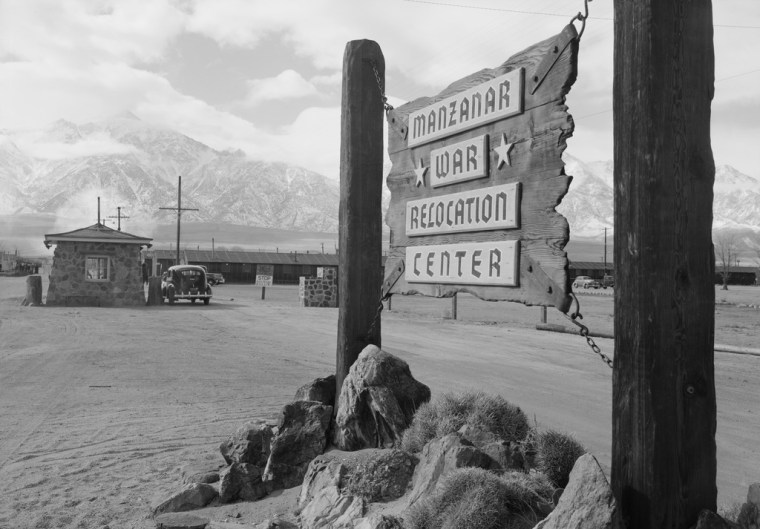A former Navy SEAL and supporter of President-elect Donald Trump cited World War II internment camps as a precedent for Trump's proposed Muslim registry during an interview Wednesday night on Fox News — comments that elected officials and community leaders are widely condemning.
Speaking to host Megyn Kelly, Carl Higbie, a spokesman for the pro-Trump Great America PAC, argued that a proposed registry would be legal. "I know the ACLU is going to challenge it, but I think it will pass. We’ve done it with Iran back a while ago. We did it during World War II with Japanese. Call it what you will, maybe wrong," Higbie said.
"You’re not proposing we go back to the days of internment camps, I hope," Kelly responded, adding, "You can’t be citing Japanese internment camps as precedent for anything the President-elect is going to do."
Higbie pushed back. "Look, the president needs to protect America first and if that means having people that are not protected under our constitution have some sort of registry so we can understand...until we can identify the true threat and where it’s coming from, I support it."
RELATED: Behind Barbed Wire: Remembering America's Largest Internment Camp
The conversation around a proposed registry comes less than one year after Trump first proposed a "complete shutdown" on Muslims entering the United States. Since announcing it, Trump has reiterated his support for a ban, but also rebranded it as "extreme vetting" and proposed narrowing its scope to persons from "territories" with a history of terror.
Trump has himself said that he may have supported internment during WWII. "I certainly hate the concept of it. But I would have had to be there at the time to give you a proper answer," Trump told TIME in December 2015. Then-candidate Trump also said during an appearance on MSNBC that he viewed internment and a ban on Muslims as "a whole different thing."
RELATED: George Takei Invites Donald Trump to Watch 'Allegiance,' Learn About Internment
In a statement Wednesday morning, Democratic National Committee National Press Secretary Mark Paustenbach criticized a "Muslim registry" as a "shameful and dangerous start" to Trump's presidency.
"Donald Trump’s proposed ‘Muslim registry’ is nothing less than institutionalized discrimination and a brazen assault on freedom of religion. The Trump team has clearly forgotten history and they’re already dooming their own chances of success by repeating the worst mistakes of the past," he said.
Rep. Judy Chu, chair of the Congressional Asian Pacific American Caucus (CAPAC), and Christopher Kang, national director of the National Council of Asian Pacific Americans (NCAPA), both implored Trump in statements on Thursday to "reject any proposal that seeks to profile, target or register Muslim Americans — or anyone in our nation."
"Like Japanese incarceration, imposing a registry upon American Muslims is not only unconstitutional, but it goes against our very principles as a nation. We will remain vigilant and push back against the creation of any such registry, and implore the President-elect to recognize the basic civil and constitutional rights of all Americans," Chu said.
In a statement from the Japanese American Citizens League, the organization emphasized the importance of understanding why internment was not a form of protection. "Higbie’s attempt to cite Japanese American incarceration as a precedent for this type of action is frightening and wrong. It’s a statement intended lay a marker for a misguided belief that ignores the true lessons of Japanese American incarceration. This lesson was captured in the words of a federal commission that said, ‘…The broad historical causes which shaped these decisions (to incarcerate Japanese Americans) were race prejudice, war hysteria, and a failure of political leadership,'" the JACL wrote.
The last and most controversial of the 10 WWII internment camps, the Tule Lake Segregation Center, closed 70 years ago. By March 1946, when Tule Lake was shuttered, approximately 120,000 Japanese — more than two-thirds of whom were U.S. citizens — had been incarcerated during the six years of the war.
The U.S. formally apologized for Japanese internment in 1988 when President Ronald Reagan signed the Civil Liberties Act, which granted reparations of $20,000 to each surviving victim of the camps.
RELATED: Seventy Years After Manzanar, the Stories of Incarceration Live On
"I had just graduated from high school, where we had covered the Constitution and learned what it stood for, and what it was supposed to do for American citizens," Jim Tanimoto, who was forced to relocate to Tule Lake with his family in 1942, told NBC News around the anniversary of the closing in March. "Everything was ignored. The whole Constitution was ignored. The Constitution didn't mean anything for people of Japanese ancestry in 1942."
On Thursday, actor and activist George Takei called Higbie's remarks "dangerous," tweeting, "Have we failed to learn from the lessons of the past? I worry for America."
Takei made his Broadway debut last year in "Allegiance," a musical based loosely on Takei and his family's experience in an internment camp. He has been outspoken against Trump's candidacy, and earlier this year invited Trump to see "Allegiance" in order to learn about internment.
Rep. Mark Takano, a Japanese-American Democrat, also tweeted Thursday, writing "let's try this again," referencing statements he had made on Nov. 18, 2015, when he wrote that "the internment of Japanese-Americans (including my parents) was not a model policy."
He later released a statement calling on Trump to "immediately denounce the comments made by a surrogate" that referenced Japanese-American internment as precedent for a possible Muslim registry.
"The imprisonment of thousands of Japanese-Americans during World War II, including my parents and grandparents, is widely understood to be one of the darkest chapters in American history," he said in a statement. "These comments confirm many Americans' worst fears about the Trump Administration, and they reflect an alarming resurgence of racism and xenophobia in our political discourse."
Follow NBC Asian America on Facebook, Twitter, Instagram, and Tumblr.
